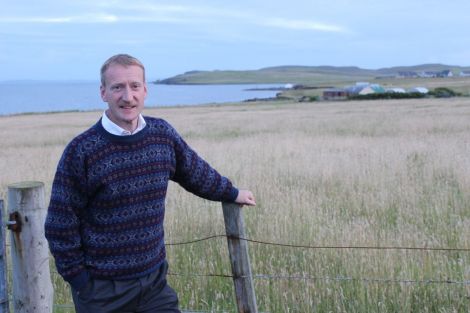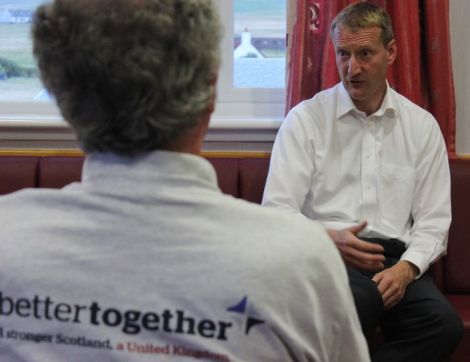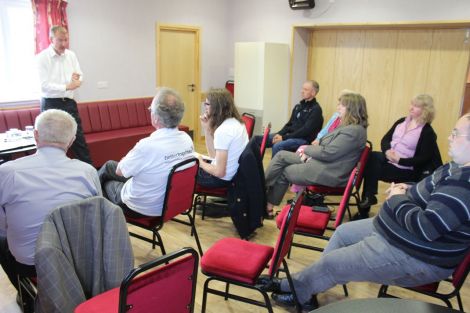Scottish Independence Debate / Scott: No vote must be decisive
SCOTLAND and the UK will have to move swiftly towards holding a conference on the future of the country after a decisive No vote in the independence referendum, according to Shetland MSP Tavish Scott.
Convinced the country will vote to stay in the union, he stressed that the major UK political parties must act fast to honour their pledges to grant more powers to the Scottish Parliament.
Speaking after a thinly attended meeting at Hillswick public hall on Wednesday during his month long ‘Ferry to the Referendum’ tour of Shetland, Scott said: “My feeling is that there will be a No vote because of the uncertainty that independence would bring.”
He told the meeting a newly independent Scotland would be “bedevilled by an enormous and continuing negotiation” over fundamental issues such as currency, debt, defence and the European Union.
“The fact that there is no clear approach to the negotiations that will go on if there is a Yes vote means that people are not prepared to take the risk.
“I think people are perfectly intellectually persuaded that Scotland could be independent, but they don’t think the risk is worthwhile.”
Citing the solidarity he and others north and south of the border feel towards each other, he said Scotland would lose the resilience provided by being part of a 65 million strong single market that underpinned such things as the cost of electricity and the price of a postage stamp.
However he accepted that while much was unclear about independence, the major UK political parties had failed to spell out the consequences of a No vote.
“Miliband, Cameron and Clegg have all said there will be more powers and responsibilities. I believe them, I don’t know what those powers will look like, but I think there will be more powers,” he said.
Become a member of Shetland News
Scott wants to see Scotland raise at least 50 per cent of the £32 billion in tax it spends every year, and believes welfare should be devolved, especially housing benefit, which should be administered by local authorities.
Failure to devolve greater powers would be “a huge fillip” for the SNP and consign the country to another referendum debate in five years, he said.
Instead a conference and a Calman-style commission should be set up quickly involving representatives of all sections of political, business and civic life to decide on the shape of a future Scotland.
Unlike political commentator Iain McWhirter, who spoke to a Shetland audience on Tuesday evening, Scott sees growing cross-party support for a federal UK, which has long been a Liberal Democrat dream.
He sees a mood amongst all the parties for “a big change rather than these small incremental changes that are sometimes harder to do”.
However for that to happen politicians like himself will have to hold their colleagues’ “feet to the fire”.
“Those of us who think this has to happen have to do a job of work on this after 18 September,” he said.
As to the Our Islands Our Future campaign and the Scottish government’s resulting 80-page pledge for greater powers for the Scottish islands, Scott said he was “incredibly disappointed”, suggesting the island councils had been “lovebombed” by the SNP.
He would have liked to see the islands explore much more radical options, everything from Faroese-style independence or the Isle of Man’s crown dependency status to “just one or two more powers within the context of Scotland”.
Much of what the government had offered was already in their power to grant, he said, and he and Orkney MSP Liam McArthur intend to challenge this in Holyrood with a motion after the referendum.
That said, he wants to see the islands keep up their demand for more island powers after 18 September, whatever the outcome.
He hopes next month’s vote will be decisive with at least 10 percentage points between the two sides to lay the issue of independence to bed.
“I think people have broadly made up their minds, but the vote has to be decisive so we can move on as a country.”
Then all the parties should get together to discuss the future of the country, as happened in the late 1990s when the Scottish Parliament was set up under the guiding hand of Labour’s Scottish secretary Donald Dewar.
He predicts the SNP will have “a bit of a bloodbath” and Alex Salmond will resign as first minister, suggesting that new potential leaders like Nicola Sturgeon. Alex Neil and Mike Russell were already jostling for position.
Scott’s “Ferry to the Referendum” speaking tour has been attended by very few folk, Scott admitted, but that was because people had already made up their minds and had plenty of other ways of approaching him.
At Hillswick five local people were joined by one councillor, one ex-council official and one American student.
But the tour has given Scott the opportunity to clarify his own views on the importance of the UK and the future of Scotland.
And he seems ultimately to see a benefit in the debate, despite having previously called it a distraction from more important issues the Scottish Parliament should be discussing.
“Over the next couple of years I have absolutely no doubt that our Parliament in Edinburgh will be strengthened because of the process we are going through and we will end up with a reformed United Kingdom and a stronger Scottish Parliament at the same time.”
Become a member of Shetland News
Shetland News is asking its readers to consider paying for membership to get additional perks:
- Removal of third-party ads;
- Bookmark posts to read later;
- Exclusive curated weekly newsletter;
- Hide membership messages;
- Comments open for discussion.
If you appreciate what we do and feel strongly about impartial local journalism, then please become a member of Shetland News by either making a single payment, or setting up a monthly, quarterly or yearly subscription.





























































